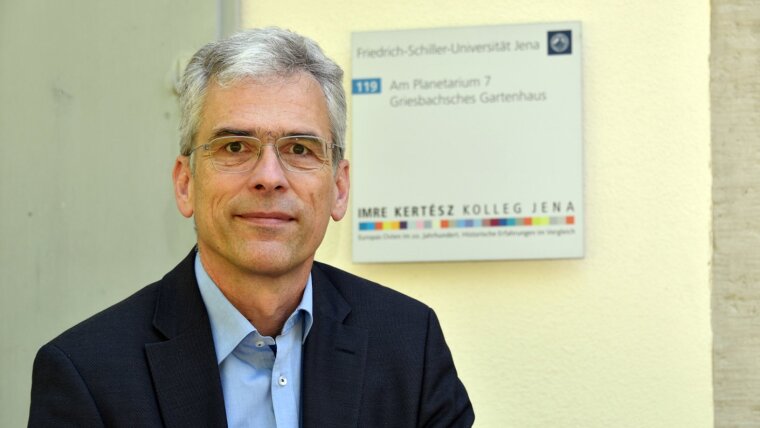
Ever since Russia launched its invasion of Ukraine on 24 February, the world has been shocked by scenes of ongoing violence. We asked Prof. Dr Joachim von Puttkamer, expert in Eastern European history and director of the »Imre Kertész Kolleg« at the University of Jena, to assess the situation. The interview was conducted almost seven weeks into the war.
Interview by Stephan Laudien
Dr von Puttkamer, can you explain the war in Ukraine to us?
We historians can place things in a greater context to create a bigger picture. In doing so, we look well beyond the last ten or 20 years. In the 20th century, Eastern Europe was heavily influenced by wars and mass violence. We can differentiate between violence that originated in the region itself and violence that was brought in from outside by belligerent neighbours. This external violence was clearly more prominent. In recent times, specifically since 1991, Ukraine has been a peaceful country internally. There was tension, of course, but it wasn’t until 2014 that violence was brought in from outside again.
The media often refer to the events as »Putin’s war« or »Putin’s invasion of Ukraine«. But Putin surely can’t wage war by himself.
The »siloviki«, who control the power structure, are interesting in this context. We’ve seen Putin give those men a roasting on camera, not least to hold them accountable and share responsibility.
Yet Putin remains the dominant force. What drives the man?
I think Putin has been pursuing a project and sees this as an opportune moment to complete it. We can also see that he may have health issues – he’s probably aware that his presidency won’t last forever. The whole propaganda aims to conjure up the idea that Putin’s plans are a national project.
But the president isn’t Russia.
Of course not. And we should be thinking beyond the war and the post-Putin era. It remains to be seen how long the people will support the war when thousands – perhaps even tens of thousands – of Russian soldiers have lost their lives, when thousands of families have been affected.
Can we count on Russian civil society?
That’s a difficult question. We’re currently witnessing enormous pressure being put on protesters who speak out against the war. Any form of dissidence, or even the slightest suspicion, is met with fierce resistance from the authorities. Students who take a stand against the war run the risk of being expelled and drafted into the army.
So, can Putin not be sure of his own people?
The official version of events used to keep the Russian population quiet is »us against the world, the world against us!«. Hardly anyone can tell how long the consensus will last.
Some people like to look far back into history to explain the background to this war. Is the »sister nations« narrative even true?
Russia, Ukraine, and Belarus have common origins in Kievan Rus’. We’re talking about the 9th and 10th centuries when the Christianization of Old Russia began. Large swathes of today’s Ukraine later belonged to the Polish crown, and then both Ukraine and Russia were part of the Soviet Union. Since 1991, Ukraine has been an undisputed sovereign state whose borders were actually guaranteed by Russia in 1994. Of course, there are still many close ties between Ukrainians and Russians, but the current conflict is only helping to deepen the rifts between them.
Is the war in Ukraine affecting the work of the »Imre Kertész Kolleg« in any particular way?
Yes, in many respects. Journalists are increasingly asking us to assess the situation, we held a panel discussionExternal link right at the start of the war, which was very well received, and we’re supporting our colleagues. For example, we’ve managed to bring Irina Scherbakowa from the Russian NGO »Memorial« to the »Imre Kertész Kolleg« for one year as a fellow with the support of the Körber Foundation, the Thuringian State Chancellery and the Buchenwald and Mittelbau-Dora Memorials Foundation. We’re also providing asylum for a couple of Ukrainian scientists on our premises.